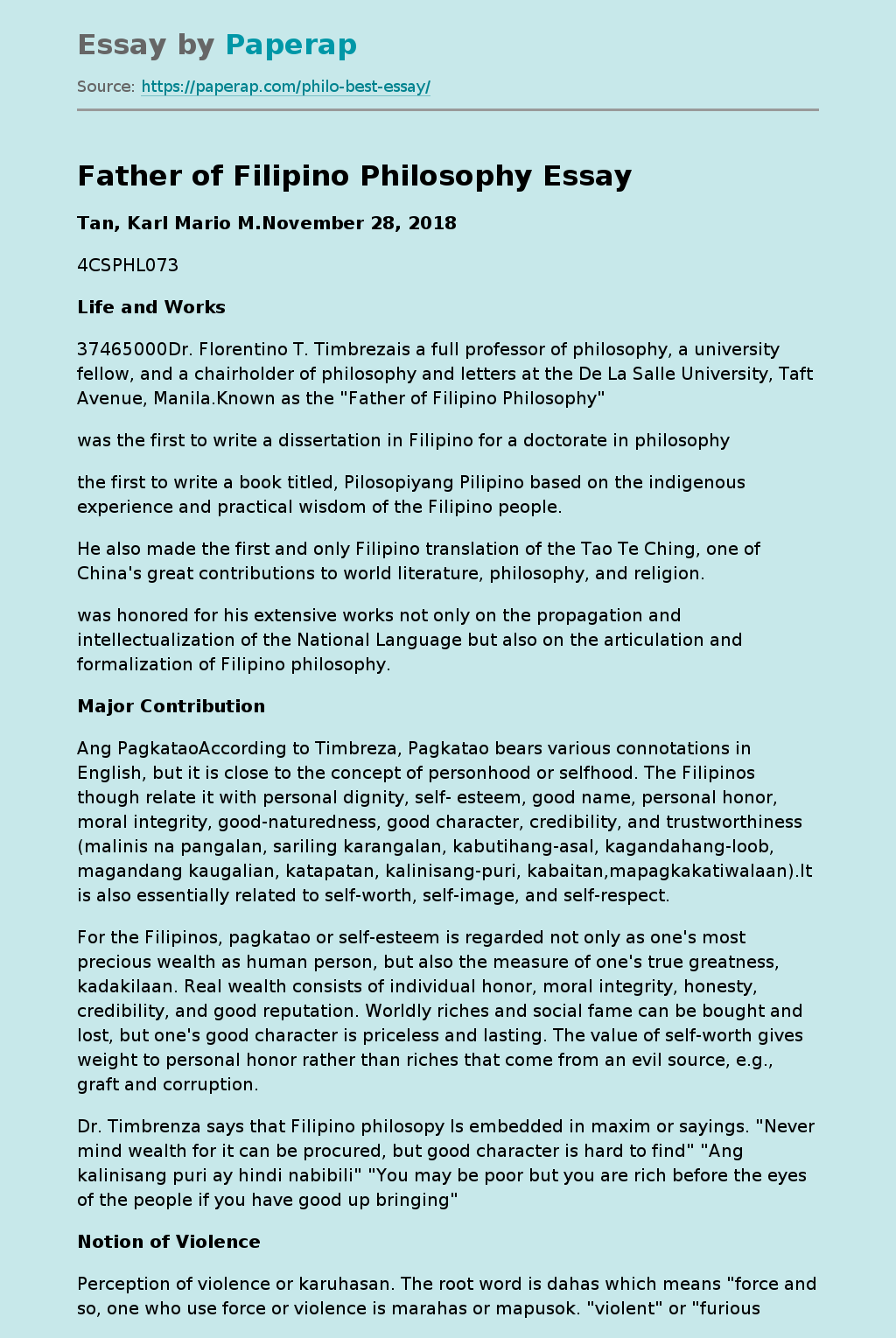Father of Filipino Philosophy
Tan, Karl Mario M.November 28, 2018
4CSPHL073
Life and Works
37465000Dr. Florentino T. Timbrezais a full professor of philosophy, a university fellow, and a chairholder of philosophy and letters at the De La Salle University, Taft Avenue, Manila.Known as the “Father of Filipino Philosophy”
was the first to write a dissertation in Filipino for a doctorate in philosophy
the first to write a book titled, Pilosopiyang Pilipino based on the indigenous experience and practical wisdom of the Filipino people.
He also made the first and only Filipino translation of the Tao Te Ching, one of China’s great contributions to world literature, philosophy, and religion.
was honored for his extensive works not only on the propagation and intellectualization of the National Language but also on the articulation and formalization of Filipino philosophy.
Major Contribution
Ang PagkataoAccording to Timbreza, Pagkatao bears various connotations in English, but it is close to the concept of personhood or selfhood. The Filipinos though relate it with personal dignity, self- esteem, good name, personal honor, moral integrity, good-naturedness, good character, credibility, and trustworthiness (malinis na pangalan, sariling karangalan, kabutihang-asal, kagandahang-loob, magandang kaugalian, katapatan, kalinisang-puri, kabaitan,mapagkakatiwalaan).
It is also essentially related to self-worth, self-image, and self-respect.
For the Filipinos, pagkatao or self-esteem is regarded not only as one’s most precious wealth as human person, but also the measure of one’s true greatness, kadakilaan. Real wealth consists of individual honor, moral integrity, honesty, credibility, and good reputation. Worldly riches and social fame can be bought and lost, but one’s good character is priceless and lasting.
The value of self-worth gives weight to personal honor rather than riches that come from an evil source, e.g., graft and corruption.
Dr. Timbrenza says that Filipino philosopy Is embedded in maxim or sayings. “Never mind wealth for it can be procured, but good character is hard to find” “Ang kalinisang puri ay hindi nabibili” “You may be poor but you are rich before the eyes of the people if you have good up bringing”
Notion of Violence
Perception of violence or karuhasan. The root word is dahas which means “force and so, one who use force or violence is marahas or mapusok. “violent” or “furious” The Filipinos believe that anybody who lives in violence will die in violence. To wit the Tagalogs declare: “Kung ano ang ikinabubuhay ay siyang ikamamatay”. The kind of life a man IiV6 will determine how he is going to die). “Ang taong marahas ay madaling mapahamak” [An impetuous person into trouble so easily. ‘Ang isang mapaghamon ay malapit sa kabaong’ [A provocateur is dose to the coffin]. ‘Ang taong palaaway, magulo angbuhay’ [A quarrelsome person leads a turbulent Life].
All these beliefs indicate the futility and brutal consequences of violence. Anybody inured to violence, the Filipinos think will likewise end up with it This is in conjunction
with the Filipino philosophy of reversion or batas ng panunumbalik “Kung ano ang iyong gawa ay siya mong mapapala [Whatever you do is what you are going to beget); or Kung ano ang ikinabubuhaymo ay siyang ikamamataymo [Whatever kind of life you live determines the kind of death you will go through). So that (Sinumang Gumagamit ng dahas ay sa dahas din magwawakas) (Whoever uses force or violence will also end up in violence).
Note the metaphors people use: the bolo” and the “knife- are symbols of blood. bodily injury or wounds. and personal danger, the “coffin’ or casket symbolizes death or physical destruction; and fire and glowing ember” signify “great disaster,” “calamity.” or conflagration. It is thus clear that. for Filipinos, the use of violence means not only *blood, wounds. injuries. and personal danger; it likewise means “great disaster: destruction: and death” itself. Violence is therefore destructive rather than creative; it destroys rather than builds. It is life-denying rather than life-arming This is the Filipino perception of violence.
whereas stone this the people profess that Daig ng tinapay ang bato The bread over comes the stone. Filipinos believe that love begets love and violence begets violence; violence is divisive rather than conciliatory, it divides unites For the Filipinos love those who hate you if you want to overcome hatred If somebody gets mad at you, repay him with affection. Force, in Filipino thought, cannot resolve conflict Force will just exacerbate the situation and create fir indifference, hostility, and resentment.
Reaction
For me Dr. Florentino T. Timbreza is a philosopher that we all must learn and understand his works and teachings about different aspects of life especially the concept of personhood or selfhood Pagkatao and values about Non-Violence of Filipinos. One of the traits of Filipinos is love like the saying love those who hate you if you want to overcome hatred If somebody gets mad at you, repay him with affection this statement shows Filipinos are forgiving people they tend to love than hate. Other traits of Filipinos are personal dignity, self- esteem, good name, personal honor, moral integrity, good-naturedness, good character, credibility, and trustworthiness. But now a days they tend to think of the things that could make them materially wealthly and happy in this they become self-centered starting to think only for themselves and their character is being molded in to new personality and they become lost. But how can we find the real worth of life? Dr. Timbreza stated that “Never mind wealth for it can be procured, but good character is hard to find”. It shows that we all need to redirect ourselves to have a good character rather than building our personal interest like wealth.
Father of Filipino Philosophy. (2019, Dec 17). Retrieved from https://paperap.com/philo-best-essay/

